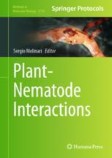Search
Search Results
-
Root-knot Nematodes (Meloidogyne spp.)
Root-knot nematodes (Meloidogyne spp.) are the most widespread, have a vast host range, vascular feeder endoparasites, and, therefore, are considered...
-
Chemotaxis in Root-Knot Nematodes
For a long time, chemotaxis in root-knot nematodes has received scant attention. In recent years, however, this topic has captured the attention of...
-
Unraveling the enigma of root-knot nematodes: from origins to advanced management strategies in agriculture
Main conclusionIntegrated management strategies, including novel nematicides and resilient cultivars, offer sustainable solutions to combat root-knot...

-
Biological management of root-knot nematodes (Meloidogyne spp.): a review
Root-knot nematodes (RKN), Meloidogyne spp. are the most agricultural pest causing quality, yield crop losses, and increased host sensitivity to...

-
Applications of Arbuscular Mycorrhizal Fungi in Controlling Root-Knot Nematodes
Meloidogyne nematodes cause diseases in economically important plants. These sedentary endoparasites modify plant roots, creating feeding sites and...
-
Direct antagonistic effect of entomopathogenic nematodes and their symbiotic bacteria on root-knot nematodes migration toward tomato roots
AimsNegative interactions in the rhizosphere between entomopathogenic nematodes (EPNs) and plant-parasitic nematodes, such as root-knot nematodes...

-
Root-Knot Nematodes (Meloidogyne spp.): Biology, Plant-Nematode Interactions and Their Environmentally Benign Management Strategies
Root-knot nematodes pose a significant threat to agricultural production all over the world. They are ubiquitous, polyphagous, sedentary...

-
Breeding for root-knot nematode resistance in fruiting Solanaceous vegetable crops: a review
Root‐knot nematodes ( Meloidogyne spp.) are the major group of plant parasitic nematodes impeding the cultivation of fruiting Solanaceous vegetable...

-
Green iron oxide nanoparticles and magnetic nanobiochar: enhancing tomato performance, phytochemicals, and root-knot nematode resistance
BackgroundGreen nanoparticles are considered to be an effective strategy for improving phytochemicals and raising productivity in soil infected by...

-
Polyphasic identification of surgacane root-knot nematodes from ten municipalities in São Paulo State, Brazil
Root-knot nematodes ( Meloidogyne spp.; RKN) are among the most destructive plant parasites in sugarcane. In Brazil, they are known to cause yield...

-
Light signaling regulates root-knot nematode infection and development via HY5-SWEET signaling
BackgroundMeloidogyne incognita is one of the most important plant-parasitic nematodes and causes tremendous losses to the agricultural economy....

-
Molecular Techniques for Root-Knot Nematode Identification
Among plant-parasitic nematodes, root-knot nematodes (RKN), Meloidogyne spp., are the most important parasite infecting economically important crops...
-
Root-knot nematodes (Meloidogyne spp.) in cucumber under protected cultivation: incidence, management and avoidable yield loss in Afghanistan
Root-knot nematodes (RKNs), Meloidogyne species, are one of the major threats to global vegetable production, inflicting considerable crop losses....

-
A survey of guava orchards of Uttarakhand, Uttar Pradesh and Haryana states in northern India to assess the spread of root-knot nematodes
Guava is an important commercial fruit crop grown in the subtropical and tropical regions of the world. India is world’s largest guava producer and...

-
Integrated analysis of the lncRNA/circRNA-miRNA-mRNA expression profiles reveals novel insights into potential mechanisms in response to root-knot nematodes in peanut
BackgroundPeanut is the most essential oil and food crop globally due to its high oil and protein content. Root-knot nematode infects peanut roots,...

-
Root–Knot Nematodes in Cereal and Pulse Crops, and Their Management by Novel Biological and Biotechnological Approaches
The root–knot nematode, Meloidogyne spp., is a most significant pest of food and commercial crops world over. The infestation with Meloidogyne spp....
-
Pathogenic variation among three major root-knot nematodes (Meloidogyne spp.) affecting guava (Psidium guajava L.) cv. Allahabad Safeda
The pathogenic potential of three root-knot nematodes, Meloidogyne enterolobii , M. incognita , and M. javanica on the guava ( Psidium guajava L.),...

-
Genetic analysis of root-knot nematode (Meloidogyne incognita) resistance in carrot (Daucus carota L.)
The genetics analysis for a specific characteristic is critical to monitor plant health along with develo** and testing novel, cost-effective, and...

-
Utilizing bio-synthesis of nanomaterials as biological agents for controlling soil-borne diseases in pepper plants: root-knot nematodes and root rot fungus
The utilization of Trichoderma longibrachiatum filtrate as a safe biocontrol method for producing zinc nanoparticles is a promising approach for...

-
Root-Knot Disease Complex: An Interactive Perspective with Microorganisms
Root-knot nematodes (RKNs) cause approximately 72% of global crop yield loss and have a vast host range of above 2000 plants. The interaction of...
